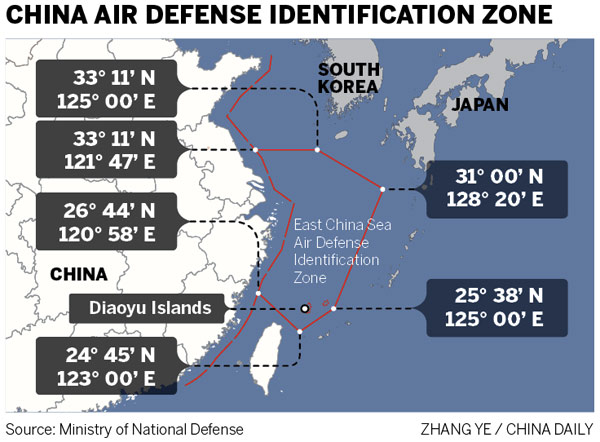Tokyo declares it doesn't recognize Beijing's first air defense zone

Governments should not interfere with any airline's decision to report its flight plans to Chinese authorities in compliance with the new air defense identification zone, observers said.
Describing the newly designated zone over the East China Sea as oriented toward defense and identification, Wang Ji, a Beijing-based military expert, said it will not disrupt or jeopardize any kind of normal international air service.
"In addition to safeguarding China's sovereignty and airspace safety, the zone will help identify dangerous factors and avoid aviation chaos, given the high tensions and sensitivity in the region.
"International airlines are strongly encouraged to acknowledge the zone by making their flight details known to Chinese aviation authorities to ensure safety," he said.
Since Sunday, two Japanese airlines — ANA Holdings Inc and Japan Airlines Co — have both informed China about their flights that pass through the area, Japan's Kyodo News Agency reported.
The two airlines have reported relevant information, including the flight number, route and cruising altitude of the plane and the flight time, to Chinese authorities when flying over the Diaoyu Islands, the agency reported.
In strong opposition to China's announcement, Japanese Chief Cabinet Secretary Yoshihide Suga on Tuesday said the transport ministry has told the airlines that Tokyo does not recognize China's move.
Japanese Transport Minister Akihiro Ota said the government will tell China that Japan will not change its administration of airspace above the high seas, adding that the ministry hopes airline companies will make appropriate decisions based on this stance.
Wang warned that airlines should not be ordered to act in accordance with the Japanese government's wishes if it means sacrificing their interests and security.
"Submitting flight plans will help minimize miscalculation. The new rules, mostly applicable to hostile and abnormal flight cases, will not affect any normal operations of international flights," Wang said.
"Tokyo's ban on its own companies is only to retain its policy consistency over this issue," he added.
ANA will make a decision after evaluating any requests from the government, Kyodo reported.
Asked if Beijing will take military actions against foreign airlines that do not comply with China's regulations, Foreign Ministry spokesman Qin Gang said on Tuesday that Beijing will react accordingly after evaluating different situations and the degrees of danger.
"However, Beijing has clearly stated that normal aviation of international flights in the zone will not be affected," the spokesman said.
Qin also responded to the latest criticism from Australia, which in a statement called the timing and manner of China's designation "unhelpful" and said it "won't contribute to regional stability".
"We ask the Australian government to properly comprehend our stance and propositions, and work with China to jointly safeguard security in related airspace," Qin said.
In addition to the recognition from Japanese companies, civil aviation officials from South Korea and Singapore have said that their airliners entering the zone will submit information to Chinese aviation authorities.
Analysts said a cooperative attitude should be welcomed and effectively acknowledged Beijing's authority over the air defense zone.
Xing Hongbo, another Beijing-based military and legal expert, said that although the zone differs from territorial airspace, it is still international practice for a foreign aircraft to report its identity, location and flight plan.
"Theoretically, airlines that refuse to submit information to China may be rejected entry," Xing said.
Japan established its air defense identification zone in 1969, and has since expanded the zone several times, so that it now encompasses three-quarters of the airspace over the East China Sea.
Xing said Tokyo should not make a fuss and apply double standards over this issue, which would further complicate current frayed relations.
"It requires a sincere and tolerant attitude from the Japanese government to maintain order and stability in the region," he said
Beijing announced on Saturday the establishment of its first defense identification zone over the East China Sea while presenting a diagram of its range and issuing related aircraft identification rules.
The Chinese defense zone covers the Diaoyu Islands. The zone overlaps Japan's air defense identification zone and also covers the US military's training area in the East China Sea.
According to the aircraft identification rules, China will take timely measures to deal with air threats and unidentified flights, including identification, monitoring and disposition.
Since 1950, more than 20 countries, including the US, Canada and Australia, have set up air defense identification zones beyond their sovereign airspace.
Reuters contributed to this story.
|
|
|
|
|
|
|
|
